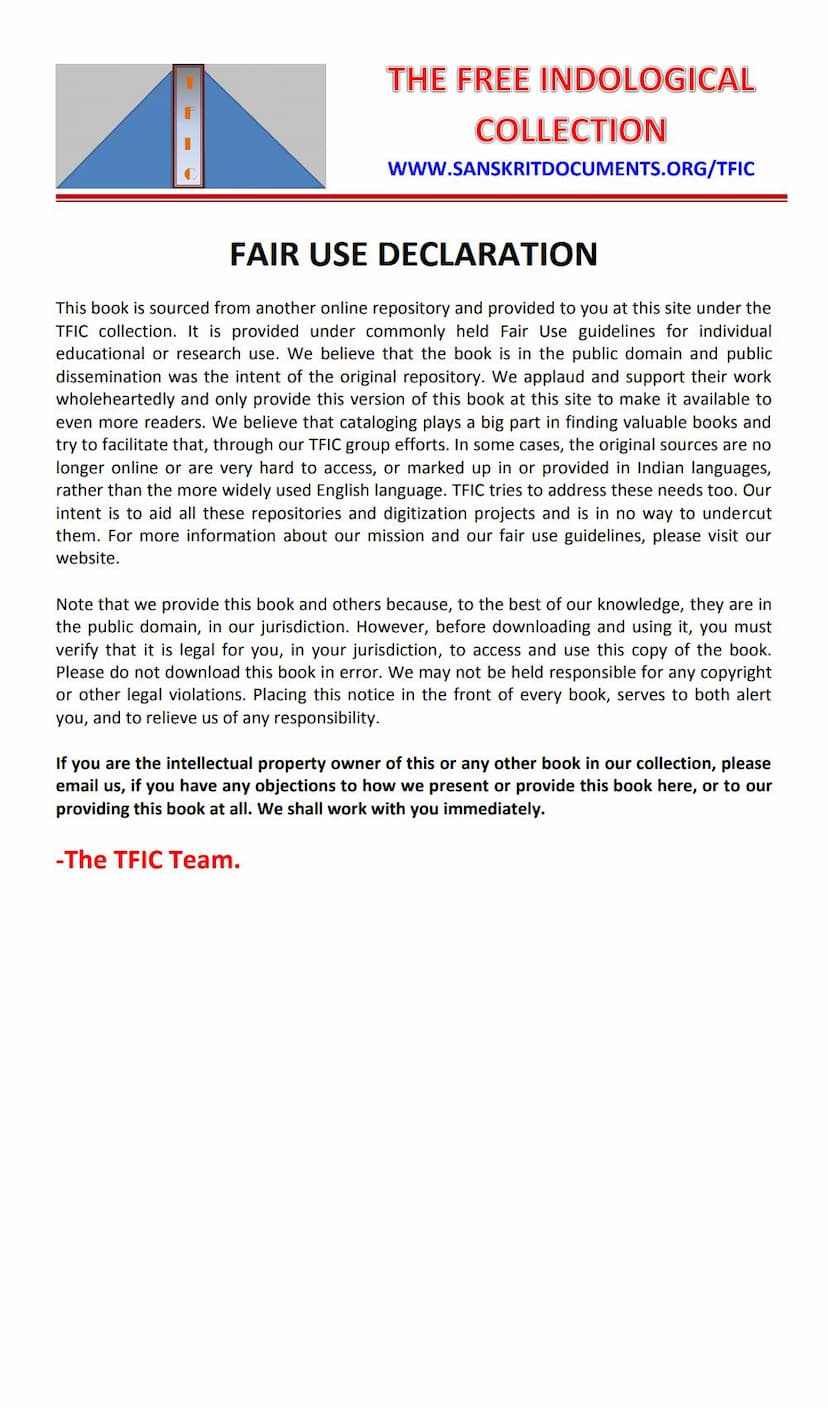Atmatattva Viveka
Added to library: September 1, 2025

Summary
This document is a preface to the Jain text "Atmatattva Viveka" by Udayanacharya, along with its commentaries by Sankara Misra and Raghunatha Siromani, and annotations by Sri Rama Tarkalankara. The preface highlights the significance of "Atmatattva Viveka" in the history of Indian philosophy, particularly in its defense of the orthodox Naiyāyika position on the doctrines of Self and God against "heretical" views, especially those of the Buddhists.
Here's a breakdown of the key points from the preface:
- "Atmatattva Viveka" (also known as Bauddhādhikāra or Bauddhadhikkāra): This work is presented as a unique and brilliant defense of the existence of the Self and God by Udayanacharya, a prominent philosopher of the Nyāya school.
- Udayanacharya's Genius: Udayanacharya is recognized for his extraordinary genius and controversial acumen. His "Atmatattva Viveka" and "Nyāyakusumāñjali" are cited as two major works in defense of orthodox Indian philosophical tenets.
- Target of Criticism: The primary adversaries discussed are the Buddhists, who are criticized for their theories of "Perpetual Flux" (Kṣaṇabhaṅga), "Ideas" (Vijñānavāda), and "Universal Void" (Śūnyavāda).
- Broader Scope: While "Atmatattva Viveka" primarily addresses Buddhist denials of the Self, the preface notes that Udayana's "Nyāyakusumāñjali" also targets other non-theistic systems like Chārvāka, Sānkhya, Mimānsā, and Jainism.
- Historical Context: The preface places Udayana in an era of intense philosophical and religious conflict in India.
- Predecessor in the Field: Utpala Deva of Kashmir, a 10th-century philosopher, is mentioned as a predecessor who dealt with similar topics in his "Siddhitrayī." Utpala's "Ajadaprāmātr̥siddhi" corresponds to Udayana's focus on the Self, while "Īśvara siddhi" corresponds to "Nyāyakusumāñjali." The preface briefly summarizes Utpala's non-dualistic (Trika) philosophical views on the Self, noting its distinctiveness from Udayana's approach.
- Nuance in Buddhist Views: The preface acknowledges that not all Buddhists were deniers of the Self. It mentions the "Pudgala" doctrine advocated by earlier Buddhist schools like the Sammitiyas and Vajjiputtakas, citing a sutra from the Samyutta Nikāya as evidence. This indicates Udayana's engagement with more developed, albeit perhaps not canonical, Buddhist views.
- Authorship and Commentaries: The preface provides brief biographical information about the authors of the text and its commentaries:
- Udayanacharya: A leading scholar of the Nyāya-Vaiśeṣika school, likely from Mithila, who lived in the 10th century AD (984 AD).
- Sankara Misra: A Maithila Brahmin, son of Bhavanatha and Bhavani, who wrote extensively in various philosophical and literary fields. His commentary on "Atmatattva Viveka" is titled "Kalpalatā."
- Raghunatha Siromani: A Bengali scholar from the 16th century, known for his commentary "Dīdhiti" on Gangeśa's "Tattvachintāmaņi." He authored a commentary on "Atmatattva Viveka" also called "Dīdhiti."
- Sri Rama Tarkalankara: The annotator whose notes on Raghunatha's commentary are included, believed to have lived in the 17th century AD.
- Manuscript Basis: The preface details the various manuscripts and printed editions used for this particular edition of the text and its commentaries, emphasizing the efforts to ensure accuracy.
- Reasons for Publication: The preface explains why the text is being published: the widespread study of Buddhist philosophy makes the refutation of their doctrines necessary, and despite its philosophical merit, the work was not widely circulated due to a lack of well-edited texts, the complexity of the subject, the relative absence of Buddhists, and its perception as "non-Vedic." The current edition aims to address these issues through careful editing, providing explanations, and elucidating the author's intent.
In essence, the preface sets the stage for a scholarly examination of Udayanacharya's critical analysis of Buddhist arguments against the concept of an eternal, substantial Self, highlighting its philosophical importance and the scholarly tradition surrounding it.